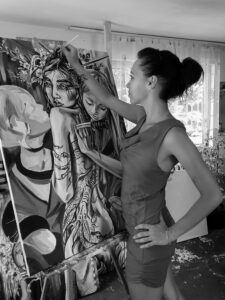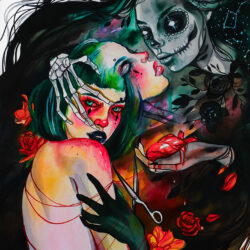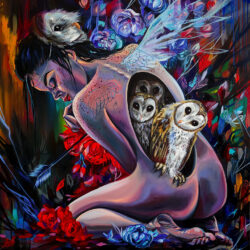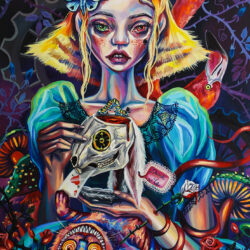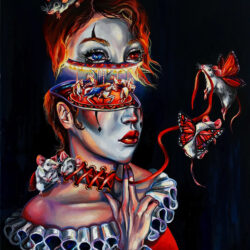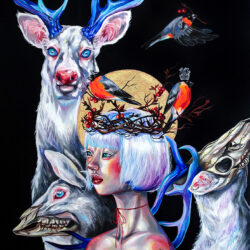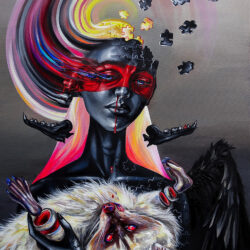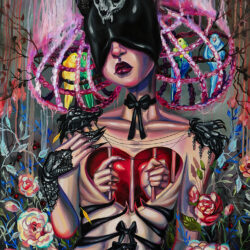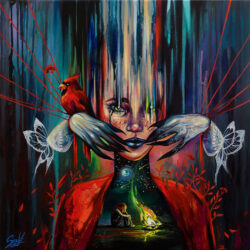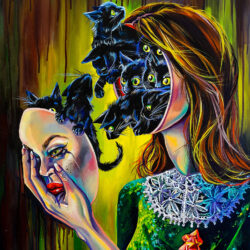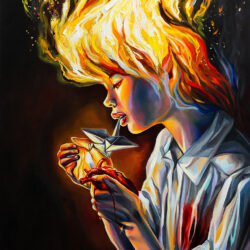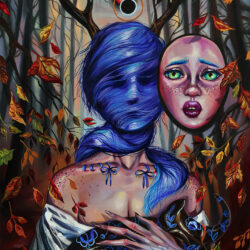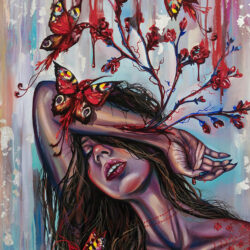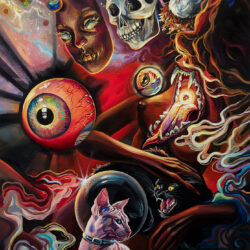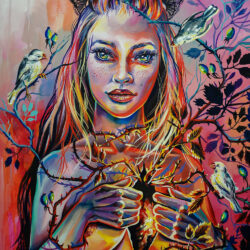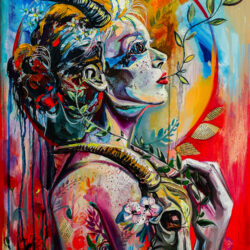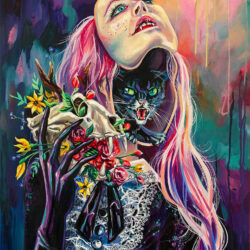Q: How are you inspired to create the powerful and compelling art you are known for?
A: This is a very complex process for me. Often images flash into my brain, details that I know will depict a future painting, an important moment of it. Often these visions are hazy and incomplete, so I consciously work on the details in my head. I shape it in myself until I can clearly see the main character and what I want to communicate through it, using the pieces of detail I’ve seen before in my mind. This can take days or even weeks, depending on the subject of the painting.
I often work on several paintings at once, always picking out what has the strongest emotional motivation for me and what sounds loudest in my mind and heart. These visions don’t disappear until the work is completed. From the first chaos, the thoughts finally clear up and the finished work is outlined. The colors always come so naturally to the given artwork, I just simple know where I have to put them and which one will fit the best to the painting. I feel the colors inside myself. It’s a kind of conversation. They tell me where they belong to.
Q: What inspired the post-editing that turns your models into marionette dolls?
A: My desire for freedom and truth has always been very strong since I was a child. For me, puppet dolls symbolize a sense of vulnerability. I try to capture the feeling by them that they cannot control their own lives under the influence of some external force.
Q: Were you exposed to art as a child through visits to museums or books?
A: As a small child, I didn’t realize that I would stand out artistically in anything. I drew instinctively, for me it was as natural as taking a breath. Later, when I was 9 years old, under the influence of my parents, I went to a drawing session, where I could paint with teenagers much older than me, where I first met the awareness of art. Here I could see exhibitions for the first time, I could also organize my own exhibition. After that, I longed to see books and places that are vividly attached to painting.
Q: Do you begin with a theme in mind, or does it emerge while you are working? Does your inspiration come more from internal or external sources?
A: As I mentioned earlier, for me, it’s more of an internal process. On the other hand, it is not always clear whether these visions are imprints of a previous external effect or projections of an entire internal event. As an artist, I am also sensitive to world events, experiencing everything on a spiritual level, so perhaps most accurately, I say both affect me at the same time. External influences will become internal events. Which I then put together into a complete piece.
I am primarily preoccupied with the darker aspects of human relationships, inspired by the painful, often unprocessed pieces of the mind and soul. Since I can’t live in an airtight bubble, I can’t say I’m not affected by external stimuli that manifest in my paintings as well.
Q: Did your family support your art or encourage you? Or was there anyone special in your life who encouraged your talent?
A: Yes, my parents have always persevered and supported me both spiritually and financially to do what I love. I am infinitely grateful to them for being able to stay here today. I love them so much. I also feel lucky myself that fate sent me a close friend a few years ago who could help me a lot, so that I can be fulfilled as an artist. Without him, I would not have been able to accomplish this all alone. I had mental breakdowns and spiritual issues for many years, I didn’t have the confidence to paint as an adult. After 10 long dark years, I started painting again under his influence. And I didn’t regret it. I learned a lot, and still learning how I can love who I truly am. This is a never ending progress I think. Struggling with myself is an integral part of my art, and I’m happy to have people around me who won’t let me forget where the right direction is.
Q: Do you need to have the right environment or setting to create your art? If so, what preparations do you make to prepare the surroundings you work in?
A: Absolutely. My studio is very important to me and completely affects the creative process in what environment I can work in. I need peace and quiet to be able to concentrate. Many times inside, my thoughts are so loud that I would not be able to immerse myself in the work under other circumstances. I have an interesting own little chaos in my atelier. I love every single splashes on the floor, the hard brush strokes on my easel, they are the “fingerprints” of my previous works and thoughts. In those messy labyrinth if feel myself so comfortable. This place is my own island and it takes me wherever I want. Anytime. I also love my new unopened blank canvases. Each promises a new opportunity. I love the knowledge that whatever can happen to them, they will get a story that is then always told differently depending on who looks at them. This is what freedom means to me. An endless line of possibilities.
Q: Are you inspired by films or music? If so what in particular do you love?
A: I really love good films and musics. I am an omnivore from old classics to new content. It depends entirely on my mood what I want and what I would like to listen to. However, it doesn’t often happen to me that a movie or music would at least consciously inspire me in any way. But to refute this, I recently saw a mini series that had a big impact on me and I want to paint the female character in my vision in a surreal way. This was the Queen’s Gambit. It is amazing and inspiring at the same time.
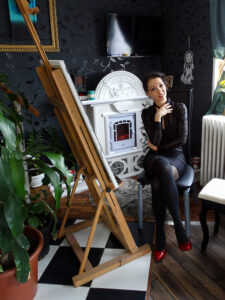 Q: As an artist, what do you feel indicates success? Is it financial, or a good review, the inclusion in exhibitions, a solo show, publication? Does the bar continue to rise? Or do you feel that success is more internal, confidence in your craft, a degree of self-satisfaction?
Q: As an artist, what do you feel indicates success? Is it financial, or a good review, the inclusion in exhibitions, a solo show, publication? Does the bar continue to rise? Or do you feel that success is more internal, confidence in your craft, a degree of self-satisfaction?
A: I paint mainly because I can’t not paint … for me this is my being, I need it like a heartbeat. At first I painted for myself, it was a good effect on me to be able to paint my feelings, my storms. It was definitely filled me with a kind of spiritual gratification, otherwise it is still the case today.
Later, my friend encouraged me to create a page where I presented my early work and people loved and praised it all over the world. They shared in the pain, depth, and height of the paintings. That’s when I first experienced what it really feels like to be an artist, to make an impact on people’s emotional worlds. I lived it as a success, but I knew almost immediately how much responsibility it would entail. It took me a couple of years before I was able to look at my work beyond the emotional plane in business. But I think success is accounted for differently by everyone. In addition to the fact that invitations, sales, the organization of exhibitions are good for a person, the biggest success for me will always be that my paintings touch people in a way that many times would not have thought.
It’s a cycle because if they love what I do and represent, there will be a demand for it as well. If someone stands up in front of the general public, self-confidence is essential. I am all trying to stay authentic and original so that my audience really gets what they expect from me. There’s always room for improvement, there’s always something to crave, so you should never stop and sit back, that’s just my opinion. I’m always wondering what the next step should be, I want to create something new, one that hasn’t existed before.
Q: Do you have formal training?
A. If so, what institution did you attend? Do you feel having a degree has helped you be more successful? Did you make any lasting connections at school or find that attending a formal institution gave you any advantages you might not have had otherwise?
B. If you are self-taught, do you feel that the lack of formal training has hindered you in any way? Did you find any road blocks due to a lack of a degree? Do you feel there were advantages by not having a formal teacher, such as a unique perspective without other influences?
A: When I was a kid, I went to special drawing and painting training and then graduated from art high school. But I don’t have a degree in painting. What I know today I have mastered over the years, based on my own experiences. I am a painter by my heart and soul, not by papers.
In retrospect, I don’t mind at all that I didn’t get a degree in painting. I never joined the line, even at school I had a hard time finding a voice with education. I was a rebel and vehement, having a hard time finding a common denominator with me. I was so lost, and sad about it. But maybe that’s why I can be so free in my own art today. I walk my own way, I follow my heart. I respect the basics and everyone’s opinions, but that doesn’t mean I’m able to keep my thoughts within limits. And I don’t want to do that anymore. I’ve always listened at school that it’s not good what I do, I don’t have to do that much, etc … Those were very hard times..
There were times when I would have applied for competitions, but since I didn’t have a degree I couldn’t. But after I found my own style in painting then I let go of this thing. People love my work because they are as they are, honest, raw and free from any powdering. They show the dark sides of the mind and soul unabashedly. I don’t know what it would have been like if I graduated from university … but I’m not even bothered by the issue today. I try to focus on being able to always create something meaningful and profound. In order to help those who are spiritually in need, they are going through a difficult period. And if I could only make one person’s day better, or I could make him happy because a painting of mine hangs there on his wall and it fills him with hope every day, I say every fight is worth it. I should never give up, and I encourage everyone to do the same with my paintings.
Q: If you had the power to change the world, to create a new beginning, what would it be, what would you change?
A: If it were up to me we would be much closer to nature and each other. There would not be a relationship subordinated above that much so that people could experience their own values, their true inner values, because it takes the world forward. This is exactly why I paint, among other things. I would like to draw attention to people’s internal events. Because nowadays everything is about outside. Many people show something different than what they actually feel. There is only a thin line between silence and lying. People often forget what is important.
Q: What advice do you have for young artists just starting out?
A: I so want to answer not in commonplaces because I believe that good advice can accompany you for a lifetime. But I can only say what I know from my own experience. And that is NEVER but really NEVER give up. If you believe that what you are creating is self-identical with you, and by that you are in it, with your heart and soul, then the right platform will find you as well.
Never believe that you are few, that you are not good enough. As long as you feel inside that you have something to say to the world, there will be no problem.
Build relationships, friendships, because it is important to have people supporting you. Talent alone is scarce, will and perseverance to be added and endless humility needed. If you’re persistent enough, you might be lucky enough to get noticed. Trust in yourself, and practice a lot.
Q: Do you feel that the community: local, state or government needs to be more supportive of the arts? If so, in what way?
A: I don’t think enough emphasis can be placed on art and culture. One of our most elementary parts is art from prehistoric times. We drew sooner than we talked. That is why I think this sector should be supported even more, leaving room for new things, new waves, because they create communities and opportunities. I respect and appreciate the traditional arts, but it is a great pain to me that the new raw materials are given little space. I can hardly see any serious contemporary surreal exhibitions, although for me this is one of my favorite art trends. I specifically want to be able to tell the content of the thought behind the paintings and there are surprisingly few opportunities for it. Maybe if galleries here (respect for the exception) were a little more open to new styles, people could get closer to these types of creations as well.
Q: Have you had the opportunity to benefit from grants or commissions funded by the state or government or private institutions? If so, can you share your experiences?
A: No, I have not had this kind of opportunity yet.
Q: If you could have a conversation with anyone from our past, any era, who would it be and why?
A: I really love antiquity, especially Egyptian mythology, I feel close to it for something I could never really define. I want to meet Cleopatra and Nefertiti in the company of one (or more) bottles of good wine. Where we would discuss world-saving views and caress at least a thousand cats. I would be very curious to see what they see as the secret to success, how they were able to awaken thoughts beyond their age, stay strong and independent.



